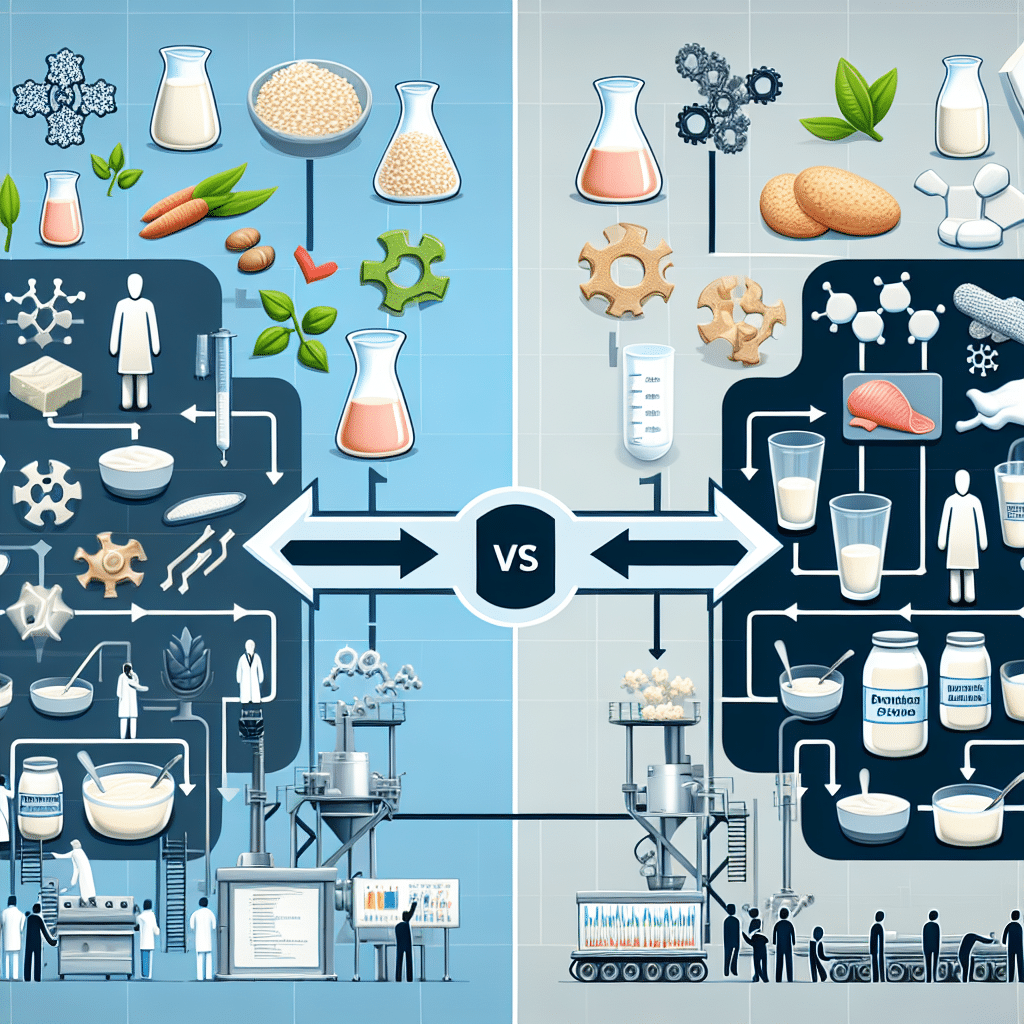Formulating with Plant Proteins vs Dairy Proteins: Challenges and Current Solutions to Fill the Gap
-
Table of Contents
- Plant Proteins vs Dairy Proteins: Navigating Formulation Challenges
- Understanding the Protein Landscape
- Challenges in Formulating with Plant Proteins
- Current Solutions to Fill the Gap
- Case Studies and Examples
- Statistics and Market Trends
- Conclusion: Bridging the Protein Divide
- ETprotein: Your Partner for High-Quality Plant Proteins
Plant Proteins vs Dairy Proteins: Navigating Formulation Challenges

The rise of plant-based diets and increased consumer awareness around lactose intolerance, allergies, and ethical concerns have led to a surge in demand for plant proteins. However, formulating with plant proteins presents unique challenges when compared to traditional dairy proteins. This article explores these challenges and the current solutions that are helping to bridge the gap between plant and dairy proteins.
Understanding the Protein Landscape
Proteins are essential macronutrients that play a critical role in building and repairing tissues, producing enzymes and hormones, and supporting overall health. Dairy proteins, such as whey and casein, have long been the gold standard in terms of nutrition, functionality, and taste. Plant proteins, derived from sources like soy, peas, rice, and hemp, offer an alternative that caters to the growing vegan and vegetarian population, as well as those looking for more sustainable and allergen-free options.
Challenges in Formulating with Plant Proteins
- Sensory Attributes: Plant proteins often have strong, distinctive flavors and may contribute to gritty or chalky textures in finished products.
- Functional Differences: Unlike dairy proteins, plant proteins can vary widely in their ability to emulsify, gel, or foam, which affects the texture and stability of products.
- Nutritional Profile: Plant proteins may have an incomplete amino acid profile and lower digestibility compared to dairy proteins.
- Solubility: The solubility of plant proteins can be lower than that of dairy proteins, impacting the clarity and consistency of beverages.
Current Solutions to Fill the Gap
Despite these challenges, the food industry has made significant strides in improving the functionality and appeal of plant proteins. Here are some of the current solutions:
- Flavor Masking: Advanced flavor technologies are being used to neutralize or mask the off-notes of plant proteins, making them more palatable.
- Protein Blending: Combining different plant proteins can create a more complete amino acid profile and improve functional properties.
- Enzymatic Treatment: Enzymes can modify the structure of plant proteins to enhance solubility, digestibility, and functional performance.
- Extrusion Technology: High-moisture extrusion cooking can transform plant proteins into fibrous textures that mimic meat, improving their sensory appeal.
Case Studies and Examples
Several companies have successfully tackled the challenges of formulating with plant proteins. For instance, Beyond Meat uses a combination of pea, rice, and mung bean proteins to create a burger that closely resembles the taste and texture of beef. Ripple Foods has developed a pea protein-based milk that matches the creamy texture and nutritional profile of dairy milk.
Statistics and Market Trends
The global plant protein market is expected to reach $14.5 billion by 2025, growing at a CAGR of 7.1% from 2020 to 2025. This growth is fueled by consumer demand for sustainable, ethical, and health-conscious alternatives to animal proteins. The success of plant-based products in the market is a testament to the effectiveness of the solutions being implemented to address formulation challenges.
Conclusion: Bridging the Protein Divide
While formulating with plant proteins presents distinct challenges, the food industry’s innovative approaches are successfully closing the gap with dairy proteins. By leveraging flavor masking, protein blending, enzymatic treatment, and extrusion technology, manufacturers are creating plant-based products that satisfy consumer expectations in terms of taste, texture, and nutrition.
ETprotein: Your Partner for High-Quality Plant Proteins
If you’re looking to incorporate plant proteins into your product formulations, ETprotein offers a range of high-quality options. Their organic rice protein, clear rice protein, pea protein, and other plant-based proteins are characterized by a neutral taste, non-GMO, and allergen-free attributes. With purity levels exceeding 98%, ETprotein’s products are suitable for a variety of industries, including nutraceuticals, pharmaceuticals, and food and beverage.
ETprotein’s commitment to excellence is evident in their reputation as a trusted supplier for leading global brands. To explore how ETprotein can meet your protein needs, contact them at sales(at)ETprotein.com today.
About ETprotein:
ETprotein, a reputable protein and L-(+)-Ergothioneine (EGT) Chinese factory manufacturer and supplier, is renowned for producing, stocking, exporting, and delivering the highest quality organic bulk vegan proteins and L-(+)-Ergothioneine. They include Organic rice protein, clear rice protein, pea protein, clear pea protein, watermelon seed protein, pumpkin seed protein, sunflower seed protein, mung bean protein, peanut protein, and L-(+)-Ergothioneine EGT Pharmaceutical grade, L-(+)-Ergothioneine EGT food grade, L-(+)-Ergothioneine EGT cosmetic grade, L-(+)-Ergothioneine EGT reference grade and L-(+)-Ergothioneine EGT standard. Their offerings, characterized by a neutral taste, non-GMO, allergen-free attributes, with L-(+)-Ergothioneine purity over 98%, 99%, cater to a diverse range of industries. They serve nutraceutical, pharmaceutical, cosmeceutical, veterinary, as well as food and beverage finished product distributors, traders, and manufacturers across Europe, USA, Canada, Australia, Thailand, Japan, Korea, Brazil, and Chile, among others.
ETprotein specialization includes exporting and delivering tailor-made protein powder and finished nutritional supplements. Their extensive product range covers sectors like Food and Beverage, Sports Nutrition, Weight Management, Dietary Supplements, Health and Wellness Products, and Infant Formula, ensuring comprehensive solutions to meet all your protein needs.
As a trusted company by leading global food and beverage brands and Fortune 500 companies, ETprotein reinforces China’s reputation in the global arena. For more information or to sample their products, please contact them and email sales(at)ETprotein.com today.












